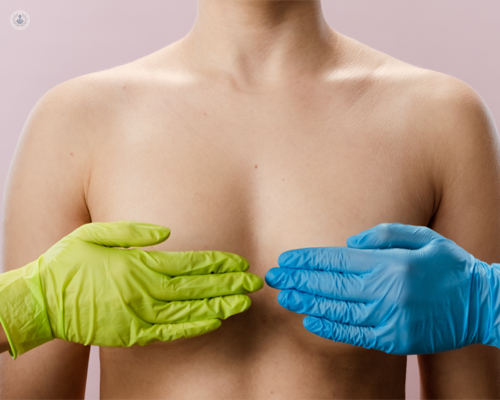Managing breast pain: An expert's guide
Written in association with:There are many reasons why breasts can be painful. Although the pain may cause worry and discomfort, it is very unlikely that this pain is a symptom of a serious condition, like cancer. It often is due to hormonal changes. In our latest article, leading consultant oncoplastic breast surgeon Mr Chris Cartlidge explains the causes of breast pain, how to manage the pain, and what to do if the pain persists.

What are the most common causes of breast pain?
There are two common causes of breast pain. The first is pain occurring in the muscles or chest wall, perhaps due to overuse or stretching or an injury, and is felt as pain within the breast. The second main cause is a pain in the tissue of the breast itself. This is often due to areas of breast tissue that are responsive to the female hormones in your body and can become painful due to localized swelling or inflammation.
Is it normal for only one breast to hurt?
Often people with breast pain may have pain in both breasts but equally it may affect just one breast. The fact that pain is only affecting one breast is not a particularly worrying sign itself but if this persists for over three months then it may be worthwhile seeing a doctor.
When should I see a doctor about breast pain?
In general, I would recommend that you try some simple interventions such as simple painkillers in the first instance. It is very reasonable to seek advice from a doctor if pain persists for over 3 months or if it is severely interfering with your work and/or lifestyle. If you notice a lump or thickening of the breast or if there is a change in the nipple such as a new inversion (nipple goes inwards) or bloody discharge you should also seek medical advice urgently.
How does a doctor determine the cause of breast pain? What tests are commonly done?
The doctor will take a history and ask you if there are any particular factors that exacerbate or relieve the pain and whether it varies with your menstrual cycle. They will also ask about previous breast problems or a family history of breast cancer. You will be examined to allow the doctor to check if there are any lumps or other areas of concern within the breast. If the doctor is happy that there is nothing concerning at this stage then they may give you explanation and advice and discharge you. Otherwise, they might arrange for a mammogram (breast X-ray) or ultrasound scan of the breast to examine any concerning areas. If a lump is found then this might need to be biopsied to check it is not a cancer.
Are there any lifestyle changes, foods/vitamins which help to ease recurrent breast pain?
There is no particular evidence of foods or supplements that are able to ease breast pain. I recommend a healthy lifestyle and diet and a supportive, non-underwired bra. You should have your bra fitted formally if you haven’t done so within the past 12 months.
How can I manage my symptoms of breast pain at home?
You can use simple painkillers such as paracetamol. You may also find it useful to use ibuprofen gel and apply it to the area of the breast that hurts (provided you can take ibuprofen normally). Some women who are going through the menopause or have cycle-related pain find it useful to take evening primrose oil or starflower oil supplements. Wear a supportive (non-underwired) sports-type bra including overnight if this is when the pain bothers you the most.
If you would like to book a consultation with Mr Chris Cartlidge to discuss breast pain, you can do so by visiting his Top Doctors profile.



